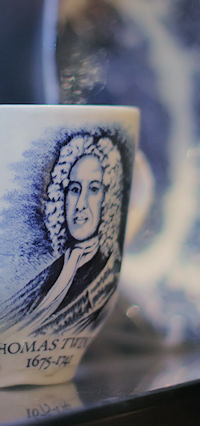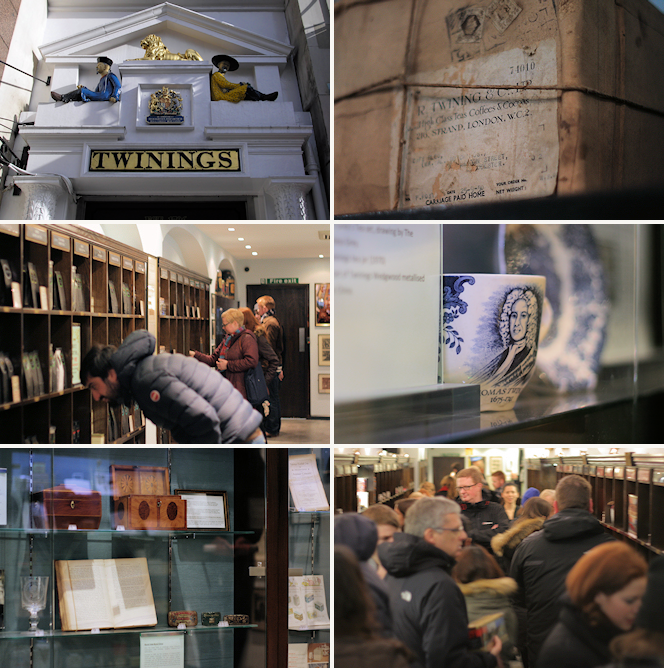Twinings
Tea boutique and mini-museum
Twinings Tea Shop And Museum, Strand, WC2

Thomas Twining was born in Gloucestershire in 1675 and the family moved to London (Cripplegate, to be precise) when he was nine years old. Following in his father’s footsteps, Thomas trained as a weaver but soon switched to a new trade, working for an East India Company merchant who imported exotic products from Asia, including that fashionable new beverage, tea.
By 1706 the young entrepreneur had saved enough money to strike out along his own path and he opened Tom’s coffee house in Devereux Court, off the Strand. His knowledge of sourcing and blending tea gave him a competitive edge over other the area’s many other cafés (some of which began to buy tea from him).
Within a few years, Thomas had acquired adjacent premises and opened what may have been the world’s first dry tea and coffee shop, at the sign of the Golden Lyon. The shop expanded over the decades and – after some extensive rebuilding and the closure of Tom’s coffee house – ended up with an imposing entrance on the Strand. The business has now traded for longer from the same site than any other shop in London, though further rebuilding was required after Devereux Court was wrecked in the Blitz.
The store’s 18th-century customers included Christopher Wren, Josiah Wedgwood, Jane Austen, and William Hogarth, who bargained with Thomas Twining to let him paint his portrait in return for having his unpaid bill cancelled – at least that’s how the shop’s present-day staff tell the story.
In 1771 Richard Twining took the reins of the business – which is still called R Twining and Company Limited today. In his capacity as spokesman for the tea dealers of London, Richard successfully (and eloquently†) lobbied the government to drastically reduce the hitherto punitive taxes on their stock in trade. The Commutation Act of 1784 cut the tax on tea from 119 per cent to 12.5 per cent. Once tea became affordable to all it quickly established itself as Britain’s de facto national beverage.
The Twining dynasty also diversified into banking, at first for the benefit of family and friends, and later for a variety of merchants – but especially tea traders. The cashiers even changed cheques partly in notes and coin, with the balance being paid in tea or coffee. Lloyds acquired and absorbed the Twining and Co. bank in 1892.
The tea side of the business remained independent for longer – but in 1964 the family sold out to the groceries and retailing conglomerate Associated British Foods. ABF remains the owner of R Twining and Co. Ltd. – although you wouldn’t know this from a visit to the Twinings website.
Thankfully, ABF has kept the shop going strong and retains the services of tenth-generation tea specialist Stephen Twining, who acts as a global ambassador for the brand – as well as curating the museum’s collection of tea caddies. These and other historic artefacts and memorabilia (including Queen Victoria’s Royal Warrant) are mostly locked away inside glass-fronted cases towards the rear of the store, although some larger objects are on open display. In the trading section at the front, the walls above the shelves are lined with portraits of eminent Twinings.
Most visitors are delighted by this historic boutique but it gets the occasional disparaging review – usually from someone whose expectations were perhaps unrealistic. People complain that there are lower prices or a wider choice of teas and coffees to be found online, or that staff aren’t as knowledgeable about the museum exhibits as they might be. Hidden London thinks these flaws are forgivable in the circumstances (and most of the exhibits are well labelled).
The only real drawback is that the narrow shopping aisle can get crowded, especially at weekends, as the photo bottom right shows. Moving to new, larger premises would be sacrilege so customers desiring more elbow room just have to visit at quieter times, such as early on a weekday.

R Twining and Company Limited, 216 Strand, London WC2R 1AP
Phone: 020 7353 3511
Web page: Twinings: 216 Strand
Open: Monday–Friday 9.30am–7pm, Saturday 10am–5pm, Sunday 10.30am–4.30pm
Admission free
Nearest station: Temple (District and Circle lines)
Further reading (and a source for some of the details above): Markman Ellis, Buying Tea in 1801
Nearby‘Roman’ Bath
†Richard Twining’s campaigning efforts included publishing a several lengthy pamphlets, which were written with evident passion and considerable erudition, and displayed some flashes of acerbic wit. He was accordingly nicknamed the “Tract-writing Twining” – and the tracts sold well too.
* The picture of Twinings’ shopfront on this page is adapted from an original photograph by ‘Gryffindor’ at Wikimedia Commons, released into the public domain. All the other pictures are copyright Hidden London.

